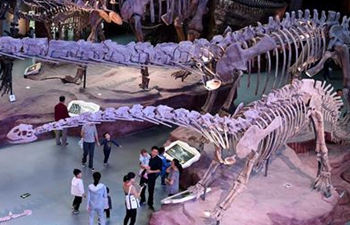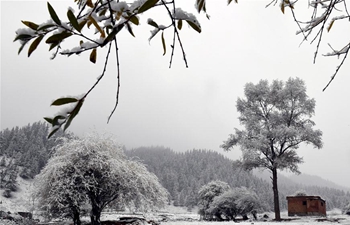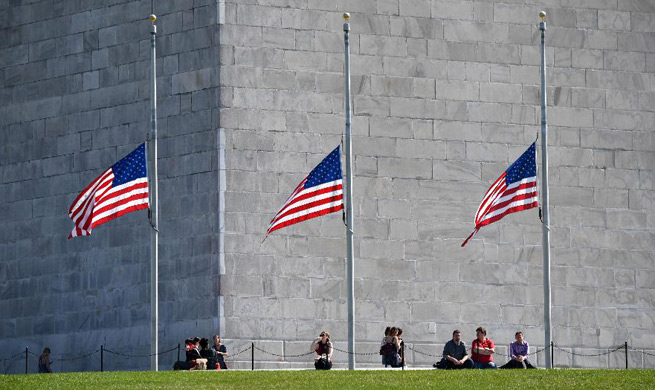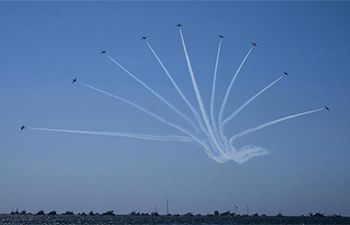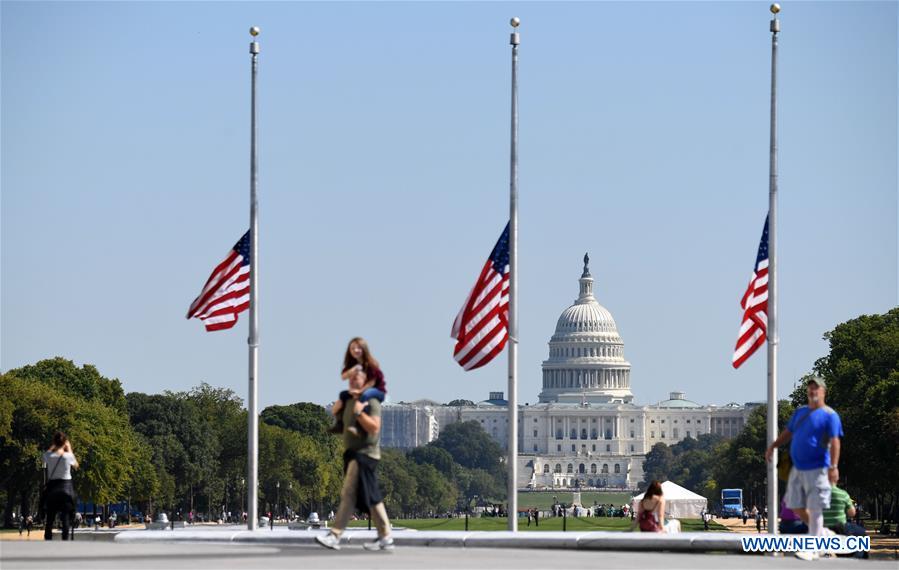
U.S. national flags fly at half mast near the Capitol Hill to mourn the victims of a mass shooting at a concert in Las Vegas, in Washington D.C., the United States, on Oct. 2, 2017. (Xinhua/Yin Bogu)
WASHINGTON, Oct. 3 (Xinhua) -- As the U.S. public remains perplexed at the motive behind the Las Vegas mass shooting, a debate on whether the killing was an act of terrorism has torn open deep wounds.
As law enforcement officers foraged the crime scene and the home of the alleged killer 64-year-old Stephen Paddock, they are struggling to find any clue as to why the retired accountant went down this horrifying road.
Speaking at a news conference Monday, Las Vegas Metropolitan Police Department Sheriff Joseph Lombardo said the nature of the attack is yet to be determined, and labeling the attack as "terrorism" was premature.
"We do not know what his belief system was at this time. Right now, we believe it is a sole actor, a lone-wolf-type actor," Lombardo said.
Lombardo once again played down the hype about terrorism at another news conference in the same day: "There is motivating factors associated with terrorism other than a distraught person just intending to cause mass casualty."
The Federal Bureau of Investigation was also quick to deny Islamic State's claim that it had perpetrated the attacks, saying it had been "determined to this point no connection with an international terrorist group."
The cautious position by law enforcement agencies has been called into question, as a Nevada statute defined "act of terrorism" as "any act that involves the use or attempted use of sabotage, coercion or violence which is intended to cause great bodily harm or death to the general population", which would include the shooting.
However, federal law offered a slightly different definition, the main difference being whether the crime was carried out to further political or social objectives, which is yet to be discovered in this case.
To complicate matters, both the Obama and Trump administrations have been inconsistent in their dealings with mass attacks on innocent civilians.
During former U.S. President Barack Obama's tenure, the Boston Marathon bombing, which claimed six lives, was quickly dubbed as terrorist attack, but a 2015 shooting that targeted blacks in a South Carolina church was not.
For U.S. President Donald Trump, he has been heavily criticized for his reluctance to call a white supremacist who rammed a woman to death during an August rally at Charlottesville "terrorist," but was eager to label the Muslim attack in the 2016 Orlando nightclub shooting as "terrorist."
The mixed standards applied by U.S. politicians have highly politicized the term, with both ends of the political spectrum trying to nail the term to the other side while trying to deny any links between the name to their allies.
The deep political rift have compounded heated debates in public forums on the internet on whether Paddock's action constitutes an act of terrorism and whether the government was purposefully stopping short of linking the case to terrorism.
Hollywood actress Emmy Rossum tweeted "50 dead. Over 400 in the hospital, and we continue to call this a LONE WOLF? Call it TERRORISM because that's what it is."
Pakistani American comedian Kumail Nanjiani took a satirical jab at the official position via twitter, saying "Let's wait until we hear his name before we label it terrorism or not," hinting that "terrorism" was more likely to be linked to certain racial or religious groups in U.S. politics, and that Paddock, who is an old, white male, would make him immune to the label.





